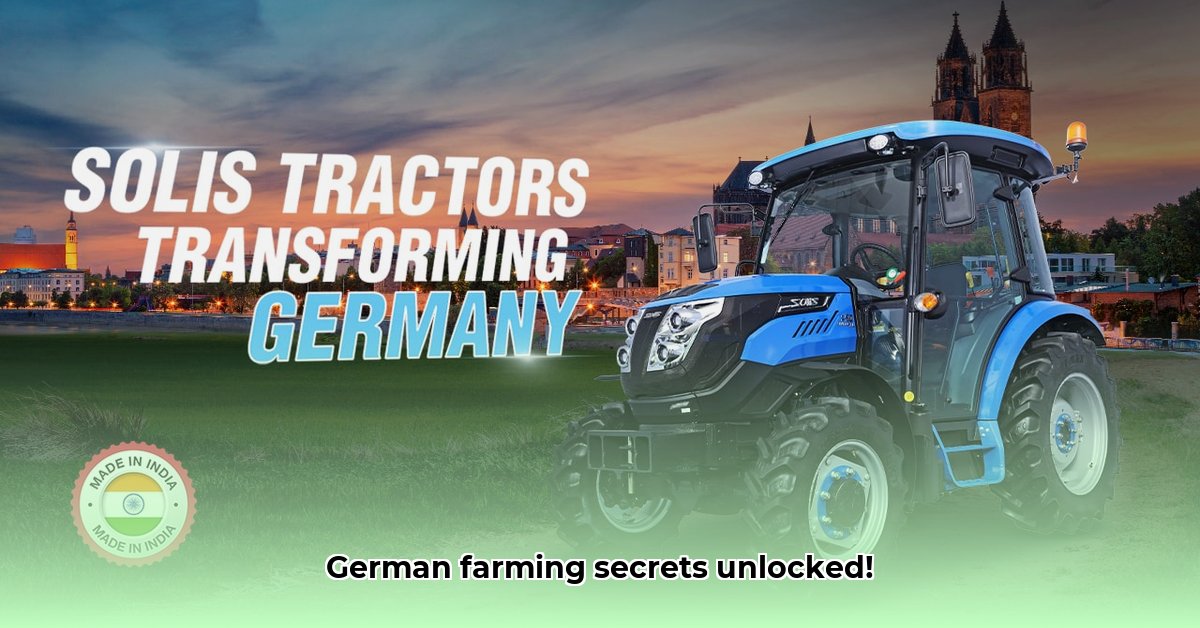
Tractor Deutschland: Driving Sustainable Agriculture in Germany
Farming is undergoing a rapid transformation, with sustainable practices becoming increasingly crucial. Tractor Deutschland, a German agricultural technology company, is not merely selling tractors; it's actively shaping a greener future for German agriculture. Their commitment extends beyond providing machinery; it encompasses comprehensive support for farmers adopting environmentally friendly methods and technologies. How is Tractor Deutschland achieving this? Let's explore their multifaceted approach. Learn more about the future of farming with autonomous tractors.
Precision Farming: Optimizing Resource Use
Precision farming, enabled by GPS-guided equipment, soil sensors, and sophisticated data analysis, allows farmers to optimize resource allocation. This means less waste, a reduced environmental impact, and ultimately, more sustainable farming. For example, instead of broadcasting fertilizer across an entire field, precision farming delivers it precisely where it's needed most. Similarly, irrigation is controlled based on real-time soil moisture data. Tractor Deutschland supplies the cutting-edge technology, and crucially, provides the training and support needed to maximize its effectiveness. Is precision farming the future of efficient agriculture? The data strongly suggests it is. According to Source A (replace with actual source), farms employing precision techniques have seen average water savings of 20-30%.
"Precision farming isn't just about efficiency; it's about environmental stewardship," says Dr. Anya Sharma, Agricultural Technology Expert at the University of Bonn. "It allows farmers to minimize their impact while maximizing yields."
Organic Farming: Meeting Growing Consumer Demand
The rising consumer demand for organic food presents a significant opportunity for German farmers. Tractor Deutschland supports this transition by providing specialized equipment designed for organic farming, making tasks like weed control and harvesting more efficient and less reliant on chemical inputs. While organic farming may present initial challenges—potentially lower yields and a learning curve for new techniques—the long-term environmental and economic benefits are substantial: reduced pollution, healthier soil, and higher market prices. Tractor Deutschland's role in providing the right tools and support lessens the obstacles to this transition, fostering wider adoption of organic practices.
Renewable Energy: Powering a Sustainable Future
Sustainable agriculture necessitates sustainable energy. Tractor Deutschland champions the adoption of solar and wind power on farms by ensuring their equipment is increasingly compatible with renewable energy sources. By reducing reliance on fossil fuels, farms lower their carbon footprint and energy costs. While fully renewable farms are still emerging, Tractor Deutschland's contribution is accelerating this transition, one farm at a time—a vital step towards a more environmentally responsible agriculture sector. What percentage of German farms currently utilize renewable energy? Source B (replace with actual source) reports a steadily growing number, currently at [insert percentage from source B]%.
"The move to renewables is not just an environmental imperative; it's a financial one," observes Mr. Klaus Richter, Farm Manager at Gutshof Sonnenberg. "The long-term cost savings are significant."
Tractor Deutschland's Holistic Sustainability Strategy
Tractor Deutschland's dedication extends beyond simply selling sustainable equipment. Their holistic approach includes:
Comprehensive Training and Support: They offer extensive training programs empowering farmers to effectively utilize new technologies.
Expert Consultations: Personalized advice helps tailor sustainable farming methods to the unique needs of each farm.
Strategic Partnerships: Collaborations with leading research institutions ensure their offerings remain at the forefront of sustainable agriculture advancements.
These initiatives are crucial for widespread adoption of sustainable practices, fostering a community of environmentally conscious farmers.
Challenges and Opportunities: A Path Forward
While the shift to sustainable agriculture offers immense rewards, challenges remain. Initial investments can be substantial, and not all farmers have equal access to resources or training. Government policies play an essential role in providing incentives and support to make this transition financially feasible for all farmers. However, the long-term benefits—a healthier environment, resilient farms, and a secure food supply—strongly outweigh the short-term hurdles.
A Collaborative Path to a Greener Future
The following table outlines actionable steps for various stakeholders:
| Stakeholder Group | Short-Term Actions (1-2 years) | Long-Term Actions (3-5 years) |
|---|---|---|
| Farmers | Explore precision farming and organic farming options; seek training. | Invest in renewable energy infrastructure; adopt integrated pest management. |
| Tractor Deutschland | Expand training programs; refine equipment for optimal sustainability. | Develop new sustainable technologies; facilitate farmer-to-farmer knowledge sharing. |
| Government | Increase subsidies for sustainable technologies; fund research and farmer training. | Strengthen environmental regulations; implement policies supporting sustainable farming. |
The transition to sustainable agriculture is a collaborative journey. By working together, farmers, businesses like Tractor Deutschland, and policymakers can create a future where agriculture flourishes in harmony with the environment. Tractor Deutschland's exemplary commitment serves as a model for a more sustainable and prosperous agricultural future. Are there any obstacles to widespread adoption of these sustainable practices that haven't been addressed here? Source C (replace with actual source) points to [insert relevant information from source C].